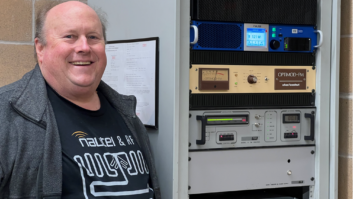The rush of new LPFM licenses in the United States has drawn plenty of attention, at Radio World and elsewhere.
But an organization that advocates for low-power FM stations says more than 600 LPFMs have actually turned in their licenses or CPs over the past 15 years — including a couple from the most recent window — because of complicated and burdensome rules.
Dave Solomon, executive director of the Low Power FM Advocacy Group, says his group has filed a petition asking the commission to reclassify low-power FM as a primary service, give a power increase, allow licenses to be sold at profit under certain circumstances and implement other regulatory changes.
Solomon stated in a press release that the FCC should not give preference to full-power FMs as it does now. “Anyone with a full power license can bump us off the air just by moving their transmitter.” The petition includes a list of LPFMs with licenses or construction permits cancelled or expired since 2000.
“If the LPFMAG achieves the goals set out in this petition, LPFM stations should become more profitable and more competitive,” Solomon wrote. “People have lost their entire life savings by just trying to serve their community. It is time we stand up and take action for past, present and future LPFM stations. The FCC must level out the playing field once and for all.”
According to a summary, LPFMAG asks that LPFM stations be:
– classified as a primary service;
– provided with expanded underwriting, “which will ultimately permit full commercials”;
– given a power increase from 100 to 250 watts with translator contour spacing rules;
– able to transfer failing LPFMs and sell them for a profit after three years;
– given the right to add “FM” suffixes to unique LPFM call letters;
– given reduced fines for violations
It offers other ideas, too, such as allowing LPFM “duopolies.”
“When LPFM was first conceived, the petitioners saw it as a fully commercial, local FM radio service,” the petition states. “There was a real public need for such a service, to reserve those areas where FM stations had been stripped away and had transferred to clusters in larger nearby markets. It was not created to be the ‘mini-NCE-FM’ service it has become and there was never a need for that type of service.” The petition concludes that “LPFM is a service that is dying a very real death.”
The Low Power FM Advocacy Group describes itself as “LPFM’s only exclusive advocacy group.” It runs the website LPFM.Today and an audio distribution hub called LPFM.Audio. Solomon calls himself “a lifelong radio man” who started as a DJ at WJNC(AM) in Jacksonville, N.C., and has worked as a large-market jock, PD, manager and station owner. He co-founded the SaveNetRadio campaign in 2007 and heads the board of WEZG(LP) in Greenville, S.C. He says approximately 50 licensed LPFM stations submitted case studies for the petition.
The FCC separately has been gathering comments recently on a petition from consultancy REC Networks that includes a power increase to 250 watts for many stations.











